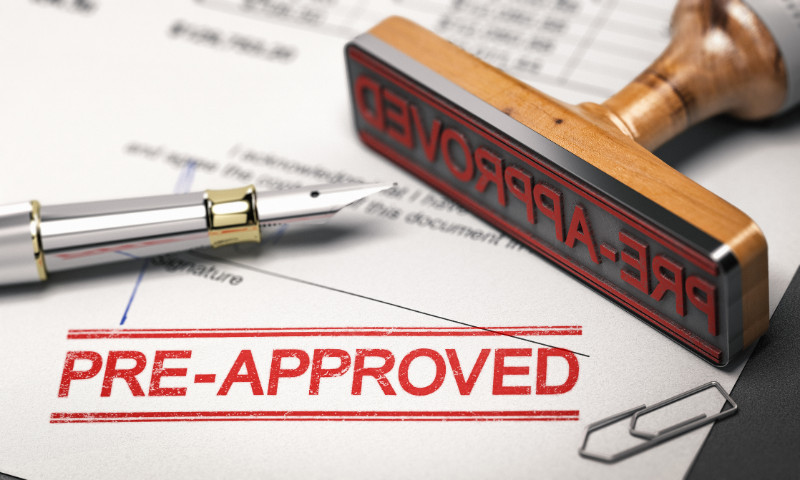
Searching for a new home is exciting. Many home buyers look forward to searching for the perfect home that matches their needs and preferences. For serious homebuyers, however, the first place to head to is a lender’s office instead of an open house.
Having a preapproval letter shows sellers that you’re serious about purchasing a home. With that in hand, it’s easier to negotiate too, as sellers are more willing to entertain buyers who show proof that they’re able to obtain financing.
Table of Contents
Key advantages of getting preapproved
Although getting preapproved isn’t a requirement, looking at homes for sale without a preapproval is not recommended, especially if you’re serious about buying. Some of the advantages you gain when you get a mortgage preapproval include:
Assurance for sellers that you’re a low-risk buyer
Getting preapproved means all your qualifications are checked in advance, which makes home sellers more comfortable and willing to deal with you. With a preapproval, sellers know you’ll be able to make a solid offer that isn’t likely to fall through, due to the fact that all of your requirements have already been verified by an underwriting team.
A preapproval letter is especially useful in a seller’s market, as some sellers choose not to spend even a second of their time on buyers who aren’t preapproved.
Easier access to showings
In some markets, there are seller’s agents who decline requests for showings from prospective buyers who do not have a preapproval letter.
If you get preapproved before you start your search for a new home, you’ll have a wider range of options to choose from since it’s easier to get showings on any home that catches your eye.
More confidence in making offers
Once you’ve found a home you’d like to buy, making a competitive offer is much easier when you’re preapproved since you already have full knowledge that you’ll be able to afford the monthly requirements.
Now that we’ve covered the basics of the importance of preapproval, the question is what to do after you get preapproved for a mortgage. On this page, we take a closer look at what happens during and what to do after preapproval for mortgage.
What’s inside:
- What happens after you get preapproved?
- Tips for keeping your loan on track after preapproval
- During the home search
- Steps in the mortgage process after you’re preapproved
- Find your dream home in the Bitterroot Valley today with DeVries Real Estate!
What happens after you get preapproved?

To help get a better understanding on what happens after you’re preapproved for a mortgage, it’s easier to divide everything into two categories: the home search and mortgage processing.
When you start your home search, there are some important steps you need to keep in mind after you get preapproved. Additionally, there are some key steps you have to be aware of during the mortgage process such as the underwriting stage, which is extremely important.
Below are some helpful things to keep in mind on what to do after getting preapproval for mortgage.
During the home search
First, we’ll cover the process of searching for a home and negotiating after successfully getting preapproved.
Working with a real estate agent
After getting preapproved by a lender, it’s common for homebuyers to look for a real estate agent to help them navigate the buying process. There are some agents who are reluctant to work with a client who has not been evaluated by a mortgage lender.
Successfully completing the steps involved in preapproval will make agents more willing and enthusiastic to assist you during your home search.
Looking for a home
Once you’re preapproved, one of the next steps is to begin your search by browsing online and searching for a property that meets your preapproved budget as well as your requirements and preferences.
Since you already have a mortgage preapproval letter, you know how much you’ll be able to afford, how stable your financial situation is for the purchase, and how strong of an offer you can make.
One of the key benefits of getting preapproved is you get a better idea of which homes you can look at. This helps you save time by eliminating homes that are beyond your price range, so you can focus your search only on the homes you’re able to afford.
Making an offer
As soon as you find a home you’d like to purchase, it’s time to make an offer, which is something your real estate agent will assist you with.
Thoroughly evaluating the seller’s asking price is a very important step. You want to make sure it’s reasonable by taking a look at comparable homes that have recently sold within the neighborhood or area, also known as “comps” or comparable sales.
When making an offer, you can use your mortgage preapproval letter as a bargaining tool. Make sure to let the seller know that your offer is backed up by a preapproved loan. This increases the chances of your offer being accepted. In fact, there are sellers who will choose to go with a lower bid from a preapproved buyer over a higher bid from another who’s not preapproved.
Signing the purchase agreement
Once you and the seller have agreed on the home’s sale price and other terms and details, the next step is for both of you to sign a purchase agreement. After this is done, you can then return to your lender to complete the mortgage process.
Steps in the mortgage process after you’re preapproved
Now that we’ve gone through what happens during the home search after you’re preapproved, we’ll take a look at what to do after getting preapproval for mortgage.
Your preapproval letter’s validity
Your preapproval letter isn’t something that will last forever. Mortgage lenders are fully aware of the fact that a buyer’s financial situation changes constantly with time. Make sure you review the letter to check how long it’s considered valid.
Completing and submitting documents
You’ve probably submitted several different documents to your lender during the application stage for preapproval. Once you’ve found a home you want to make an offer on, there’ll be more documents you’ll need to submit.
For one, you will need to submit a signed copy of the purchase agreement, which is required for appraisal purposes. Your lender may also request other letters of explanation and other documents and may ask more questions once you’re ready to buy a home.
The lender will consider many factors before they actually grant the loan such as the home’s appraised value, possible title problems on the property, and changes to your financial situation.
Mortgage underwriting
The underwriting stage is one of the most important parts of the loan process after preapproval.
To put it simply, this is where the underwriter ensures that the borrower, the home, and all of the paperwork fulfill all of the guidelines and requirements. Some of these are imposed by secondary entities such as the Federal Housing Administration, also known as “Freddie Mac.” Other guidelines and requirements may be established by the lender itself.
The underwriter goes through all of the paperwork with a fine-tooth comb, and in some cases, request additional input and documentation from the borrower.
Resolution
Following preapproval, there’s a likelihood your mortgage lender issues a “conditional approval,” which is a situation wherein the loan is already expected to go through, but the underwriter or someone else involved in the transaction is requesting more information before they sign off.
For instance, the underwriter might request a letter of explanation regarding a specific bank transaction, which you’ll need to provide to advance the loan toward closing.
This step only happens in some cases, as there are many different factors involved.
Final approval
Once all parties involved in the transaction fulfill their end of loan approval conditions including title research, escrow instructions, appraisal, and financials, the lender checks for compliance and then issues final loan approval.
The final approval is the lender’s guarantee to fund the loan. They have already verified the borrower’s necessary assets, income, employment, and property information in accordance with the underwriting guidelines.
During final approval, the borrower typically meets with an escrow agent or notary public and signs all legally binding loan documents required by the lender.
Closing
Closing is the last step in the mortgage loan process. Often, the entire process starts with getting preapproval and ends during closing.
Upon the closing stage, you will need to review and sign more paperwork. This is where you’ll also need to pay the closing costs to finalize the purchase, which is typically through a wire transfer or a cashier’s check.
The title of the property is transferred once the buyer pays for their share of the loan funds and closing costs.
Tips for keeping your loan qualification on track after preapproval

As buyer and borrower, it’s important to keep in mind that there’s a possibility that your loan could still be denied even after you’re preapproved. While getting preapproved is helpful for homebuyers in a lot of ways, it’s still not a guarantee that your finances will push through.
A denied mortgage is one of the most common reasons behind canceled real estate transactions. In most cases, it’s the buyer or the lender who preapproved them who is at fault.
When it comes to financing a home, preapproval places you closer to the finish line. But things may go off the rails if you don’t play it right.
What to avoid
A lender’s preapproval offer is based on an evaluation of several factors including your income, credit, assets, and debt. If any major changes affect these before final approval, your offer might not push through.
Here are several important things you need to avoid prior to the loan closing:
Making large purchases
After the preapproval stage, one of the best ways to make sure everything stays on track is to avoid making any significant transactions that could have a negative impact on your mortgage qualification. Keeping your finances as static and stable as possible is always a smart move after getting preapproved.
Apply for new credit
Your credit can be reviewed at any point right up to the closing of the loan. Negative changes to your credit could modify certain terms of the deal, even break it altogether.
Your credit score will be affected if you apply for additional credit lines or loans, and accumulating more debt alters your debt-to-income ratio, which is an important factor for lenders.
Fail to pay credit card or loan payments
Remember to pay all of your bills on time. Among the most important factors that affect your credit score is payment history, and any late payments lasting 30 days or more will have a negative impact.
Change jobs
Switching jobs might be necessary for some depending on their current situation, but if it’s something you can avoid, hold off on a career change while you’re in the middle of the loan approval process.
This is because adjustments to your income could revise the initial amount you were approved to borrow.
Making large deposits
Loan officers and underwriters may view large deposits as a sign of recently borrowed money and an increased debt-to-income ratio. Any large deposits you make can be detected by a loan officer, and they need to be able to trace the origin of the deposit.
Standard payroll deposits and transfers between accounts are generally acceptable, but any large deposits that are unclear will require an explanation on your end.
Withhold important information from your lender
Encountering unexpected complications during a home search is common, but it’s important to let your lender know in case issues arise.
When you inform your loan officer right away, they’ll be able to come up with a solution. However, they won’t be able to fix any issues they’re not made aware of. Keep in mind that they’ll be monitoring your financing records anyway, so anything significant will catch their attention.
Not preparing the paperwork
If you want a seamless and stress-free transition to closing, make sure you double-check and verify everything required at the start of the preapproval process.
Collate your tax returns, bank statements, W-2s, and paycheck receipts, and make sure you have easy access to all of these. Keep in mind that some of these documents require additional time to pull up, so even if you’re certain you’ll be able to acquire them, at least you know how much time you’ll need to have everything ready on closing day.
Failing to prepare for unforeseen changes
There are no two ways about it – buying a home is a huge purchase, so there needs to be a lot of checks and balances. It’s best to stay on your toes by being ready for the unexpected while trusting the professionals that are helping you achieve your goals.
Having your mortgage denied at the last minute as a preapproved buyer is devastating. But it’s preventable as long as you keep the above tips in mind so you can avoid making costly mistakes.
Before committing to any decision that could affect your current financial situation, remember to consult your real estate agent or mortgage professional. Simply doing so will prevent you from taking a step in the wrong direction and potentially causing your mortgage to be denied.
Knowing what to do after getting preapproval for mortgage can be challenging, but with an experienced, knowledgeable, and skilled Realtor at your side, you’re well on your way to finding the perfect home that matches your needs.
Find your dream home in the Bitterroot Valley today with DeVries Real Estate!
If you want to find the finest homes available in the Bitterroot Valley, work with me, Lyric DeVries Johnson today to start your search! As a native of Bitterroot Valley and one of the top real estate resources in the area, I have assisted a long list of satisfied buyers towards reaching their real estate goals.
Work with me and my team at DeVries Real Estate today! You can get in touch with us at 406.381.2245 or by sending us an email at DeVriesLyric(at)gmail(dotted)com
